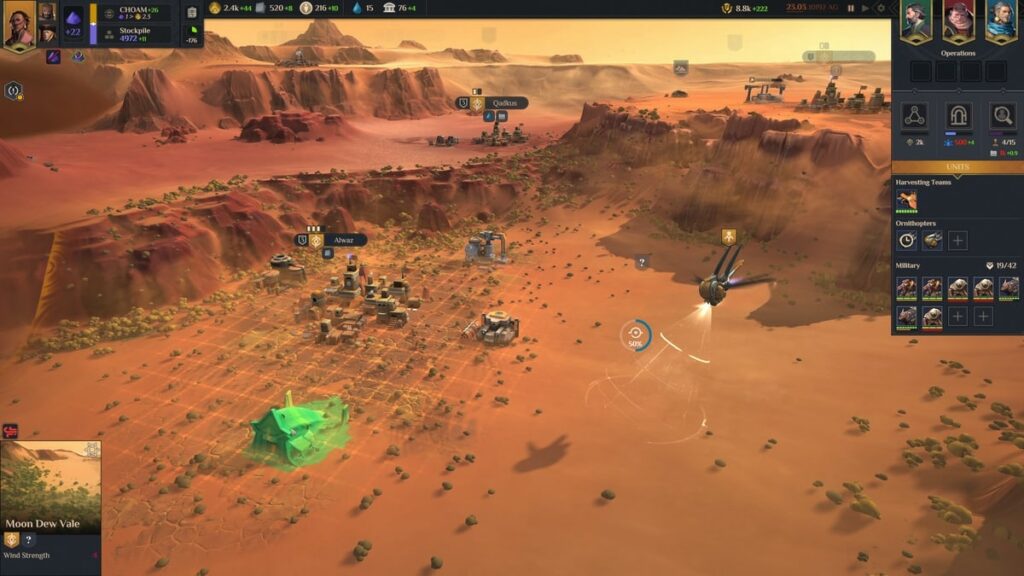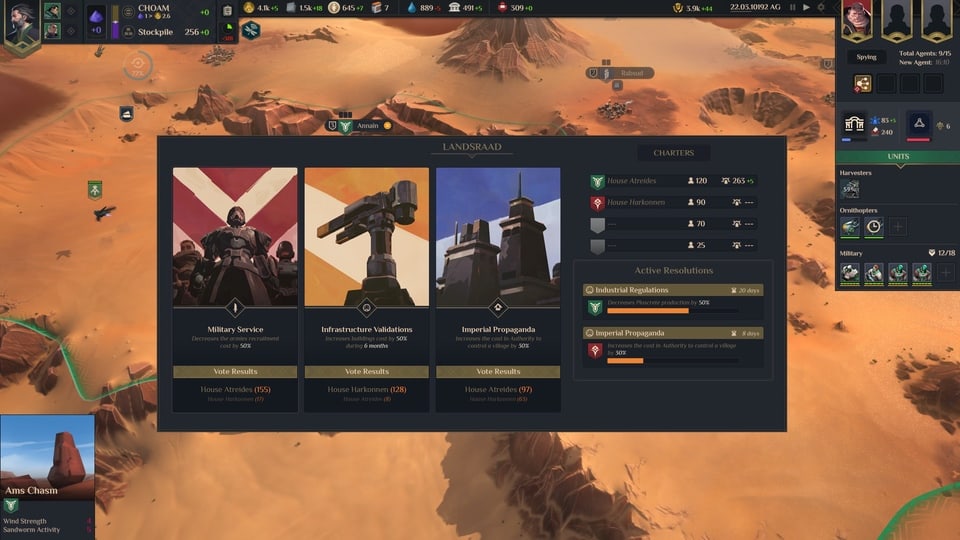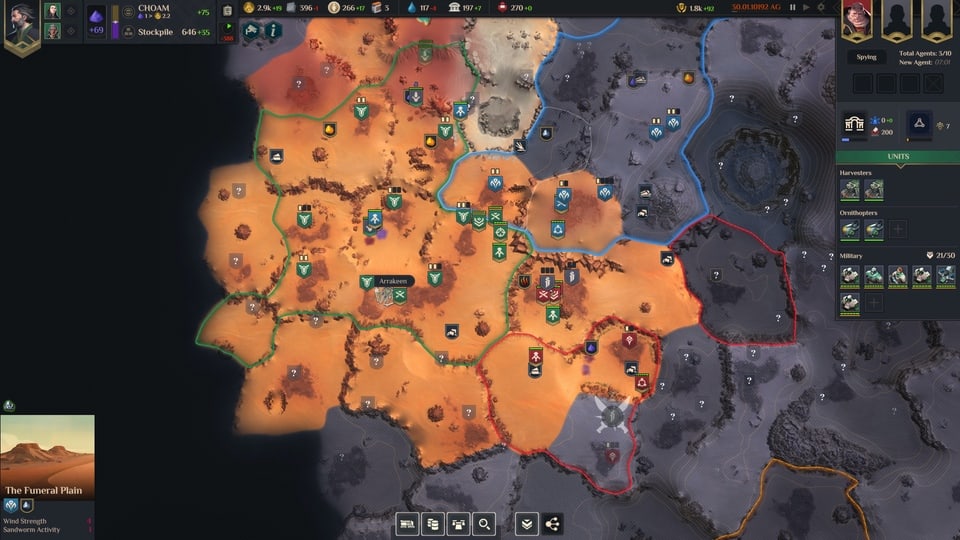For the longest time, it was commonly accepted that it was impossible to adapt Frank Herbert’s Dune in a way that truly does its defining science fiction narrative justice. Of course, that assertion was really in reference to the 1984 film, completely overlooking the clutch of well received games from the early 90s, mostly in the realms of real time strategy. Dune: Spice Wars follows in that tradition, adapting the broad strokes of the central conflict into a real time 4X strategy game.
In Dune: Spice Wars, you can really feel the influence and inspirations of adaptations that have gone before. Obviously the original Frank Herbert novel is the key to everything that Shiro Games has created, twisting the battle at the heart of that novel into a 4X strategy game that plays out between four factions, but this feels like a thoroughly modern take. In particular, you can see the Denis Villeneuve film’s influence for the beardy nature of Duke Leto, and having a female Liet Kynes. Adapting all of the intrigue, back-stabbing and messianic rise of Muad’dib is something for another game, though.
In many instances, the 4X genre takes on a turn-based form – the Civilization series and classic Master of Orion games were prime examples of this – but Dune: Spice Wars plays out in real time, similar to Paradox Interactive’s grand strategy games, or something like Sins of a Solar Empire.
As it enters into Steam Early Access tomorrow, there’s four sides to the war for control over Arrakis – the Atreides, the Harkonnen, the Smugglers and the Fremen – each have their strengths and weaknesses, nicely themed after their narrative backgrounds from the book and film adaptations. The Fremen, for example, can most easily traverse and survive the harsh desert environment of the planet, but they have no real influence when it comes to the Landsraad handing down judgements, which is really the domain of the Atreides and Harkonnens. You can tailor each faction by then choosing two of four councillors. Having Duncan Idaho by your side makes it easier to ally with the natives, while also boosting combat prowess, for example.

The scope of Dune: Spice Wars feels deliberately narrowed. You start off at your chosen faction’s home base – Arrakeen for the Atreides, Sietch Tuek for the Smugglers – and have to quickly spread your influence to control the villages in neighbouring regions, having sent your Ornithopters out to explore the world. You’ll either do this by marching in with your military units and defeating the local militias, or can convert them by spending influence, though this takes longer.
The key is really consolidating your power base, while managing to expand rapidly. Different regions have different resources to exploit, from the obvious Spice harvesting operations, to deposits that improve production of Plascrete, Fuel Cells and Solari (AKA cash). You’ll have to build factories alongside your villages to churn those resources out, but the only one that really requires risk is the Spice, as you send harvesters out to roam the desert and keep an eye out for wormsign. You’ll need to be quick if it appears, as the sandy ground starts to ripple for a few moments before the massive split maw of a Sandworm comes out to crunch down on your harvester. You can manually withdraw when a notice pings, or have the units do so automatically at the cost of production.
It’s also something to concern yourself with when marching your troops out to do battle. An extended battle off the safe rocky ground of a village can call the Sandworms as easily as the harvesters can. Each faction has variations of five core troop types with melee, ranged, explosive, and so on. You aren’t building doomstacks of military units, but rather have individual units to abstract the kind of military might talked of in the books and visualised in the films. Helping to consolidate your strength, you’ll want to build rocket defences at your border villages, as well as airfields so that you can rapidly move your units from one side of your domain to the other, potentially striking at a neighbouring enemy before they can prepare their defence.

You can, of course, take a more diplomatic approach. Neutral don’t need to be put to the sword to take them over, and even the hidden Sietches of unaligned Fremen can be bought off to lessen the frequency of their raids on your land. You can trade with your arch rivals – yes, even the Atreides and Harkonnen can trade – and strike a handful of military pacts, but the main focus of the game’s diplomacy is the Landsraad, where the empire’s Great Houses of the Imperium hand down various rules and judgements. These come every 20 in-game days, letting you weigh in on whether to accept, decline or push a proposal in a certain direction. If you’re doing well with water collection, you could accept a 30% increase in water maintenance requirements in the hopes that it stifles your opponents for 20 days, or focus all your influence on trying to secure the backing of some Sardaukar regiments for a period.
One immediate issue with starting a campaign for the first time is how many different resources there are to manage, and how distributed they are across the user interface. You have Spice which can be sold to CHOAM or stockpiled for paying regular tithes to the Padishah Emperor. Then there’s your actual cash, your building materials, manpower, water and one form of influence. Yet there’s another kind of influence, a measure of your growing power, agents to assigns to different factions… it all gets a bit much trying to figure it all out, and it’s all denoted by tiny symbols. It took me a while to figure out that the symbols for buying the covert Operations weren’t some new type of resource, but were actually just where I had agents assigned to.
In general, the UI looks stylish and minimalist, but I do feel it could be massaged to improve how easy it is to understand at a glance. The tutorial presents occasional pop-ups as you interact with each part of the user interface and the gameplay, rather than a bespoke scenario. It’s fine, and the gameplay concepts aren’t terribly complex, but it could do a little more to embed new players within the multitude of resources and economies you’re keeping a tab on.

From my initial forays into Dune: Spice Wars, I’m enjoying how Shiro Games has taken the Dune universe and adapted it to video game form. I get a real board game vibe to the scale and scope of the conflict that, outside of the multi-faceted economy you need to manage, feels accessible and intuitive to pick up and play. There’s some expanding to do through early access, with a fifth faction, a campaign, and some added gameplay depth, but the core gameplay is already here.
- ABSTRACT
- access
- across
- adapting
- agents
- All
- Another
- approach
- assigned
- automatically
- Battle
- before
- Bit
- board
- Books
- boosting
- border
- build
- Building
- Buying
- call
- Campaign
- Cash
- civilization
- collection
- conflict
- could
- created
- defence
- different
- down
- Duke
- Dune
- Early
- economy
- empire
- Enters
- Environment
- Expand
- expanding
- Exploit
- explore
- eye
- Fiction
- Figure
- Film
- films
- fine
- First
- first time
- Focus
- form
- Fuel
- game
- gameplay
- Games
- General
- glance
- great
- Growing
- having
- here
- hidden
- Home
- houses
- How
- HTTPS
- i
- Idaho
- IMMEDIATE
- improve
- in-game
- Increase
- influence
- interface
- IT
- Justice
- keeping
- Key
- local
- MAKES
- manage
- managing
- master
- materials
- measure
- Military
- Modern
- more
- move
- Operations
- original
- Other
- planet
- play
- players
- power
- Production
- proposal
- RE
- Real Time Strategy
- Requirements
- requires
- resource
- Resources
- Ripple
- rise
- Risk
- rivals
- rocket
- Rocky
- rules
- s
- safe
- Scale
- Science
- science fiction
- Series
- So
- solar
- sold
- Spending
- split
- spread
- start
- Steam
- Strategy
- survive
- The
- the world
- Through
- time
- trade
- trailer
- tutorial
- ui
- Video
- Village
- war
- Water
- weigh
- withdraw
- within
- world
- yourself
- youtube











